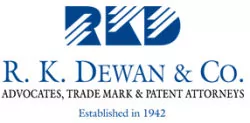In India, trademark labels can also be registered under the Copyright Act irrespective of whether such labels have any artistic content. Often these labels registered under the copyright law are used by their owners in infringement and passing off proceedings under trademark law. In M/S Khushi Ram Behari Lal v. M/S Jaswant Singh Balwant Singh W.P.(C) 7983/2012 & CM APPL. 19969/2012, the Delhi High Court held that copyright registration, cannot per se be a proof of ‘Use’ of a trademark. Both the parties to this Writ Petition are engaged in processing, marketing and exporting rice in India.
While the Petitioner, i.e. M/s Khushi Ram Behari Lal (“KRBL”) applied for registration of a device mark (“KRBL’s mark”), the Respondent had already registered the word mark “TRAIN” basis which it opposed the KRBL’s TM registration application. The Respondent placed on record, inter alia, invoices, bills, its copyright registration certificate for its mark “TRAIN”, etc. in support of its claim of continuous use of the mark over the years. Respondent stated that since both the parties dealt in the same goods (i.e. rice), there is likelihood of confusion amongst customers about the identity of the goods. Both, the Trademark Registry in India and the Intellectual Property Appellate Board (“IPAB”) refused the registration of KRBL’s mark.
However, both IPAB and the Court noted that the invoices on record had numerous discrepancies and appeared to be forged/ fabricated. The Court observed that the only cogent evidence placed by the Respondents was its copyright registration and that mere copyright registration of their mark is extraneous for the purpose of proving the use of the subject Trade Mark.
As for registration of KRBL’s device mark, the Court noted that since the Respondent only had a right to the word mark “TRAIN” and that the device applied for by KRBL was considerably different from the word mark, it was entitled to be registered. The Court also observed that KRBL’s mark has been in use for almost 22 years without any interruption and there has been no confusion and deception reported by the respondent. It held that KRBL’s application was not hit by provisions of non-registrability under the Trademark laws and the mark was entitled to the benefit of honest and concurrent use and coexist alongside the Respondent’s mark.
Compiled by: Adv. Sachi Kapoor | Concept & Edited by: Dr. Mohan Dewan
The content of this article is intended to provide a general guide to the subject matter. Specialist advice should be sought about your specific circumstances.
